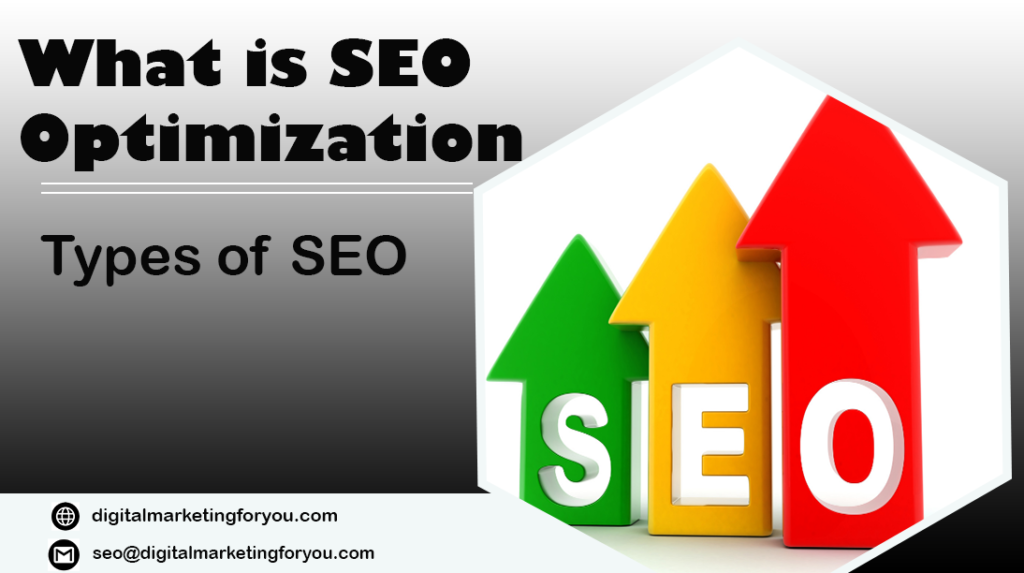What is SEO Optimization
Optimizing a website for search engines to increase its exposure and ranking in search engine results pages is known as search engine optimization (SEO) (SERPs). What is SEO Optimization is making the website more appealing to search engines like Google, Bing, and Yahoo, SEO aims to enhance organic (non-paid) traffic to the website. SEO entails a number of crucial tasks:
- Keyword Research : Finding the terms and phrases that prospective clients use when looking for your company’s goods, services, or information is known as keyword research.
- On-page optimization : It is the process of improving a single web page to raise its search engine ranking and attract more relevant visitors. Ensuring that headers, graphics, text, and meta tags (title, description) are all optimized to match target keywords is part of this.
- Link building : Getting backlinks from trustworthy and pertinent websites to raise the authority and rating of the website.
- Material Creation : It is the process of creating valuable, high-quality material that satisfies audience needs and includes crucial
- Technical SEO : In order to improve search engine crawling and indexing, a website’s technical elements—such as speed, mobile friendliness, URL structure, and security (SSL certificates)—must be improved.
- Local SEO : Local SEO is the process of making a website more responsive to local search queries. This is especially important for companies that cater to particular regions. This involves keeping an eye on local business listings and internet reviews.
SEO and Its Types

Businesses may increase the likelihood of conversions and sales by using effective SEO to draw in more targeted visits to their website. To increase website exposure and ranking in search engine results pages (SERPs), there are various forms of SEO, each concentrating on a particular area of website optimization. The principal varieties consist of:
On-Page SEO: This is the process of making certain web pages more search engine friendly in order to increase their ranking and attract more relevant visitors. Important components consist of:
- Content: Producing excellent, pertinent material that speaks to the interests and requirements of your intended audience.
- Keywords: Using appropriate words consistently throughout the text, in titles, headings, and meta descriptions.
- HTML Tag Optimization: Improving alt text for images, header tags (H1, H2, H3), title tags, and meta descriptions.
- Internal Linking: Including links on your website to aid search engines in deciphering the organization and hierarchy of material.
Off-Page SEO: To raise your website’s authority and ranking, this technique concentrates on actions taken outside of it. Essential elements consist of:
Obtaining high-quality backlinks from reliable and pertinent websites is known as building backlinks.
Content promotion on social media sites to boost exposure and get backlinks is known as social media marketing.
Getting your brand mentioned on other websites and platforms—even if there aren’t any direct links—is known as brand mentions
Local SEO: Local SEO is all about making your website more search engine friendly for local inquiries. This is especially important for companies who have physical presence or cater to a particular area. Important components consist of:
- Google My Business: Establishing and refining your Google My Business account.
- Local References: Making sure your company’s name, address, and phone number appear consistently in internet listings and directories.
- Reviews and Ratings: Managing your internet reputation and promoting favorable reviews.
Technical SEO: Optimizing your website’s technical elements will help search engines properly crawl and index it. This is known as technical SEO. Important components consist of:
- Site Speed: Making sure your website loads quickly will enhance both search engine ranking and user experience.
- Having a responsive and user-friendly website that works well on mobile devices is known as mobile friendliness.
- XML Sitemaps: Producing and publishing sitemaps to assist search engines in understanding
- Robots.txt: Robots.txt files tell search engine crawlers which pages to index and crawl first.
Every form of SEO is essential to a thorough SEO plan since it enhances different facets of your website’s functionality and exposure in search engine results.
